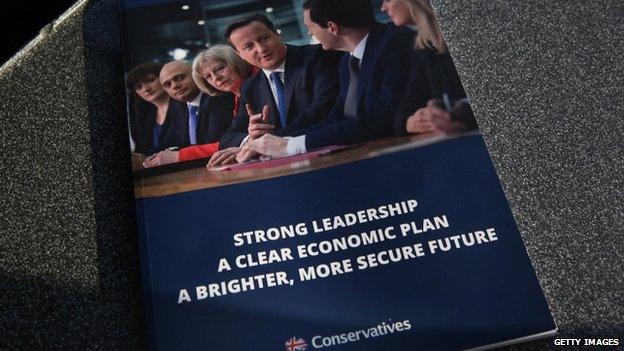Election 2015: Nigel Farage pledges 'a low tax revolution'
- Published
- comments
UKIP leader Nigel Farage said the party was putting forward 'a big tax give away'
UKIP would make working people better off through a "low-tax revolution", Nigel Farage has said as he launched his party's election manifesto., external
It would keep workers on the minimum wage out of tax, raise the 40p tax rate threshold to £55,000, introduce a new 30p tax band and scrap inheritance tax.
He said UKIP was the only party with a "credible plan" for immigration and a positive vision for the country.
The Conservatives have said there is a "£37bn black hole" in UKIP's proposals.
But Mr Farage said his was the only party with fully costed plans, which have been verified by independent economic think tank, The Centre for Economic and Business Research.
Key priorities
UKIP
Main pledges
- Rapid referendum on Britain’s membership of the European Union
- Control immigration with points system, limit of 50,000 skilled workers a year and a five-year ban on unskilled immigration
- Extra £3bn a year for the NHS in England
- No tax on the minimum wage
- Meet Nato target of spending 2% of GDP on defence, and look to increase it “substantially”
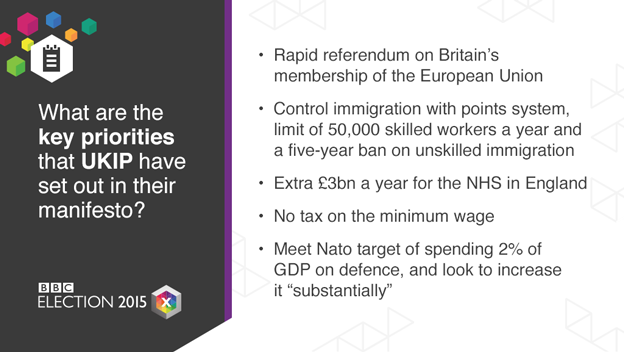
The party's proposals also include an increase of up to £3bn extra a year in NHS funding, a commitment to spend 2% of GDP on defence and a five-year ban on unskilled immigration.
UKIP, which wants to quit the EU, has said it will hold an in/out referendum "as soon as possible" in the next Parliament.
Mr Farage said his was the only party which had the "self confidence and belief in the nation" that the UK should govern itself, make its own laws and negotiate its own international trade deals.
'Big tax giveaway'
Setting out the party's election offerings at a hotel in Thurrock, Essex, the UKIP leader said politics had become dominated by giant corporate business interests while ordinary people had been "left behind" with "nobody to speak for them".
But he added: "UKIP has a plan, we genuinely want to make working people better off. And we will do that by leading the charge and making the argument for a low tax revolution.
"We genuinely want to make work pay and for people to have incentives to do better. And we believe that will unleash a kind of economic dynamism that has not been seen in this country in a long time."
Mr Farage said he was proposing an £18bn "big tax giveaway", paid for by cutting £32bn a year from government spending.
This would including cutting foreign aid spending, leaving the EU, scrapping the HS2 rail link and changing the Barnett funding formula for the nations.
UKIP's policies also include:
Introducing a new points-based immigration system
Funding 6,000 new jobs for armed forces veterans, in the police, the prison service and at the UK border
Cutting foreign aid by £9bn
Scrapping hospital parking charges
A new 30p tax band for those earning between £45,000 and £55,000 a year
Removing stamp duty on the first £250,000 for new homes built on brownfield sites
A cut in business rates for small businesses
On immigration, Mr Farage said the only way for the UK to control its borders was by leaving the European Union.
Dismissing the Conservatives' approach for a renegotiation of Britain's terms of membership of the 28-member bloc, Mr Farage said there was "no third way".
"We want our country back, and then and only then can we actually control our borders," he told the gathered media and party supporters.

Analysis by UKIP campaign correspondent Robin Brant
There are some catchy phrases UKIP wants you to remember from the manifesto launch: their campaign slogan "believe in Britain".
Their new take on immigration, it's about "space not race".
But the big takeaway, as they say in marketing circles, is this: "fully costed".
The manifesto has been given the once over by the independent Centre for Economics and Business Research and it all adds up, apparently.
UKIP commissioned the CEBR to sign off on the sums because it believes credibility is the final link in the chain.
Trying to prove it's serious about cutting and spending is the final answer to years of one-trick-pony, one-man-band accusations.
It may matter to wavering voters - disillusioned Tories or disconnected Labour supporters - who are seriously thinking about going purple.
The irony is it's almost an irrelevance for UKIP devotees.
They don't like the party because of its broad range of "fully costed" policies.
They like it because of the man whose photo features on page three. To them, UKIP is Nigel Farage.
The first test of this manifesto is whether it does indeed add up. But after that it will be judged on whether it can take the party beyond the devotees who filled the upstairs room in an Essex hotel by the M25 this morning and persuade others to vote UKIP.

The party is proposing an Australian-style points-based immigration system, which the party leader said would be ethical, fair and in the interests of the UK.
Foreign criminals would not be allowed into the country and all migrants would need to have insurance to access the health system, Mr Farage said.
Migrants would not be allowed to claim benefits in the UK unless they had paid into the system for five years and obeyed the law, under UKIP's plans.

UKIP is also pledging to, external:
Make it a criminal offence to cold call someone in respect of pension arrangements
End sex education for primary school children
Make First Aid training part of the national curriculum
Amend the smoking ban so pubs can offer a separate room for smokers
Hold a national referendum every two years on the most popular petition with over two million signatures
Restrict postal votes to those with a valid reason to have one

The resulting "big reduction in numbers" coming to the UK would relieve pressure on schools, hospitals and houses, said Mr Farage.
A Conservative spokesman said UKIP's numbers did not "add up", adding: "We all know that Nigel Farage doesn't have a credible plan for Britain - he just makes it up as he goes along."
Labour shadow minister Jon Trickett said: "UKIP have confirmed that they are a party which stands for a privileged few. UKIP are a party of Tory policies, Tory people and Tory money."
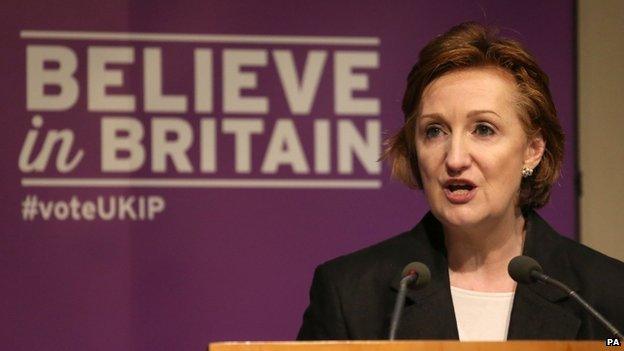
Suzanne Evans, who wrote the manifesto, said UKIP was "the only party with the money"
Green Party leader Natalie Bennett said UKIP's environmental policies were "an insult to the many people across the globe already suffering the effects of climate change".
Commenting on UKIP's commitment to spend 2% of national income on defence, former Army head Sir Richard Dannett said it was "the right thing to do" and made "a lot of sense".
Earlier, UKIP's campaign chief Suzanne Evans told BBC Radio 4's Today programme all of the figures had been independently verified by economic think tank, The Centre for Economic and Business Research.
The manifesto launch came as one of the party's senior figures, immigration and economic spokesman Steven Woolfe, admitted to disagreements with Ms Evans over the party's immigration policies.
Mr Woolfe confirmed to BBC Radio 5 live Breakfast reports in the Telegraph he said Ms Evans "didn't seem to understand" the policies were true, but that he had made the comments "weeks ago" and he was now "absolutely onboard" with his colleague.
Despite a slight dip in some recent polls, UKIP has been polling ahead of the Liberal Democrats and is hoping to add to the two MPs it gained in by-elections following defections from the Conservatives.
* Subscribe to the BBC Election 2015 newsletter to get a round-up of the day's campaign news sent to your inbox every weekday afternoon.
- Published15 April 2015
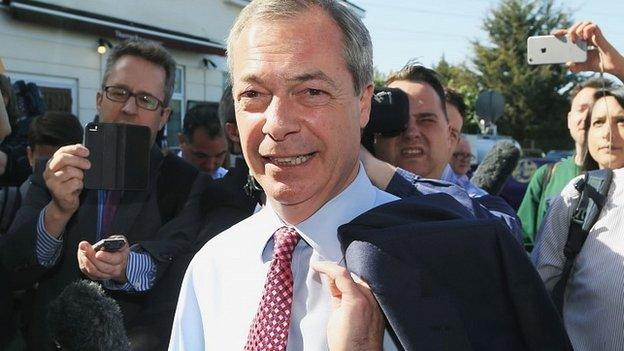
- Published22 March 2015
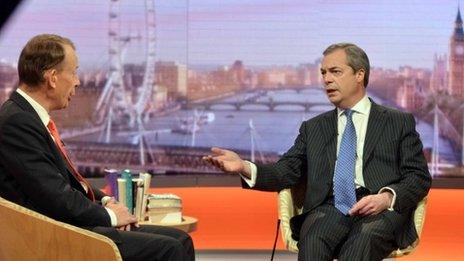
- Published14 April 2015
